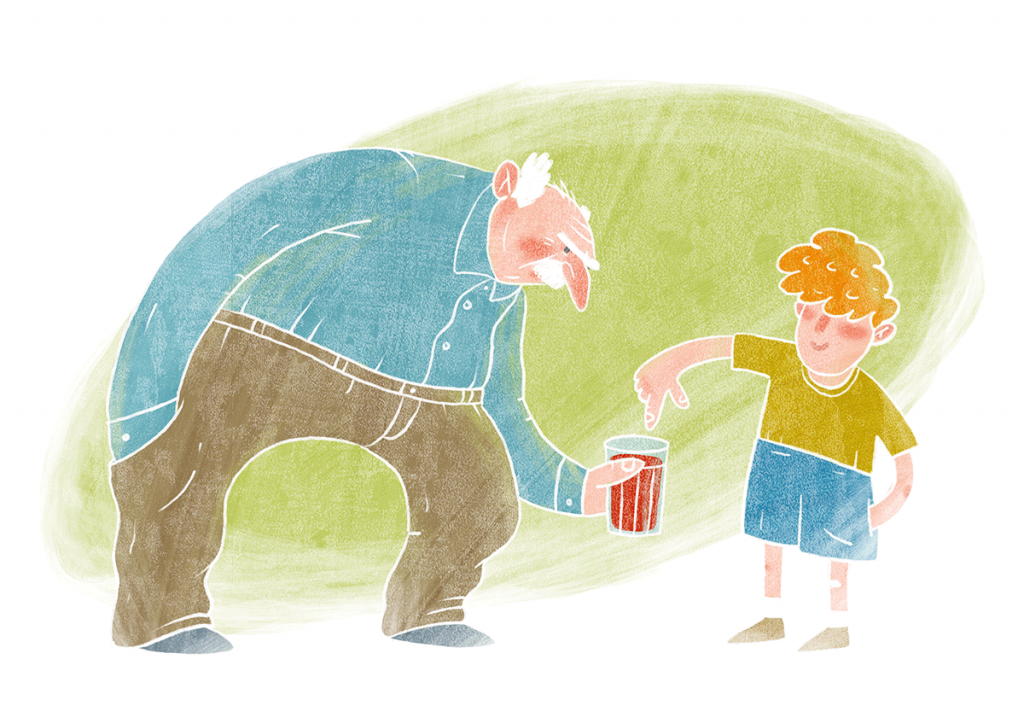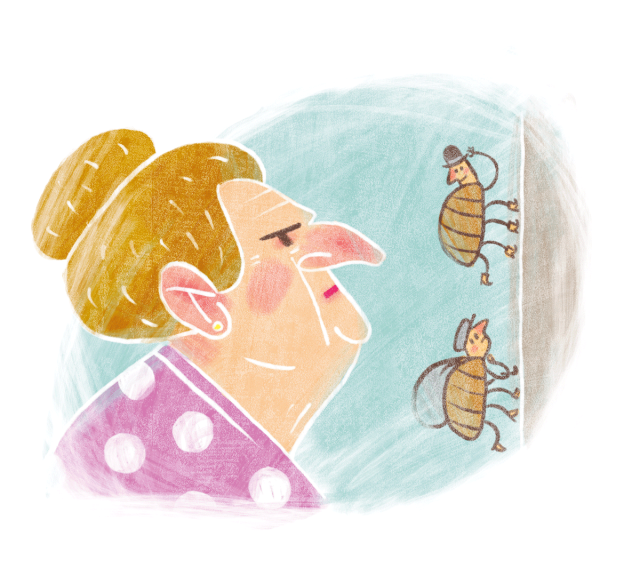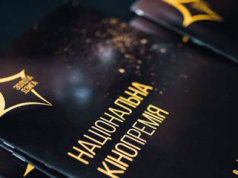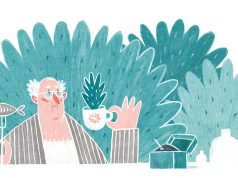The writer Yulia Verba has just published a very funny book of short stories “Spawn of the Moldavanka” set in the dilapidated communal courtyards of the working class Odessa neighborhood of Moldavanka. Historically, the Moldavanka (named for migrants from Moldova) has always been a melting pot, a cramped living space through which generations of immigrants passed on their way to assimilating into the society, a place where new slang was cobbled together out of the spare parts of the many languages that were spoken by the people who lived there. The unique language of the Moldavanka is based on jazzy improvisational colloquialisms fashioned into a panoply of multilingual slang
A Moldavanka childhood is like growing up on the set of a low-budget sitcom with a script written by students of a comprehensive Odessan jargon dictionary.
Grandmothers, both blood-related and surrogate ones from the dvorik (Ed: Enclosed yard of an apartment complex), spoke like the comical heroes of Odessan anecdotes. They were making a bazar, nervy, making a pregnant head, froze their feet. They addressed each other as “madam” and did such shameless things with cases and prepositions that Ozhegov and Dahl would die of shame.
“Can you imagine, I came into the room, and two were walking on the wall. I took a closer look — they were bedbugs!” — Auntie Ida would share with the dissident auntie Lyusia.
Bikitzer! (Ed: Odessa slang, derived from a local businessman’s name, meaning ‘Hurry up!’) — Our grandma Nila would yell from the second floor balcony to the far corners of the yard, — Bikitzer, it’s dinner time!
Little Yasha would run into the room where his mother gossiped with her friends, get comfortable on his little stool and announce “I’m here to listen to the mansy! (Ed: Odessa slang for gossip, from Yiddish)”. Kicking him out was impossible.
Uncle Arsen would complain to grandpa Pava — “I was so handsome, in white, the shoes — red lacquered, and this shiksa (Ed: a gentile woman) stood me up!”
Auntie Anya Bershtein taught her little grandson during lunch in the corridor — “Here! Say: a-bry-kot!”
My girlfriend from Lviv fell victim to culture shock when she heard someone peddling “Hot millet!” on the beach.
“Who?? Who would eat porridge on the beach?!” — She questioned in Ukrainian, and I was unable to explain to her why and how “millet” actually meant “corn”.
I must confess, that based on its lexicon, the denizens of the yard were of a definite “Zhidobandera” (Ed: an anti-Semitic slur conflating Ukrainians and Jews meant to insult both, recently has become positive self identification in patriotic circles) bent. Nobody spoke pure Ukrainian besides visitors from neighboring villages. But the residents’ so-called Russian was inevitably bastardized, and comprised of at least 70% Yiddish-Ukrainian admixture.
“Cook the borscht, asshole, I’m going to gawk at the Moskaly (Ed: slang for Russians)” — grandma Nila would inform us, broom in hand, as we sat glued to the TV watching “The Obvious and Impossible”.
“Azohen vey (Ed: from Yiddish, meaning “it’s all bad!” or “it’s all gone to shit!”), boyars” was the favorite phrase of grandma Dusya a, the mother-in-law of the district committee worker.
Even the dissident auntie Lyusia, the beacon of Russian intelligentsia, lamented over her son-in-law, asking “Where did she find this shvitzer (Ed: Yiddish for loser, braggart) to occupy my apartment? He is as distant from my Lily as a crayfish is from Moscow”.
Still, the best quotes came from my other grandmother, on my father’s side. During the putsch of 91, she complained to my mother — “These assholes turned off ‘Santa Barbara’ and played their Tchaikovsky funeral jazz all day!”
Our yard as a whole was reminiscent of a miniature copy of the USSR. Of course, there was a much wider variety of nationalities and ethnicities than ever existed among the sister republics. We had equality and brotherhood, but tolerance and tact were unheard of. Nationality was more of an afterthought, an addendum to someone’s last name, and nobody gave it much thought.
The Ivanovs from the first floor were called “katsaps” (Ed: Ukrainian slang for Russians) to their faces, auntie Musya was “the Bulgarian”, and Uncle Yasha Bershtein swore that his Anyuta was a “full-on Russian” while the Cohens were total “malantser” (Ed: Jews). Disabilities were not shied away from either, which is why the dissident auntie Lyusia’s handicapped lover was officially known as “Gosha one-hand”.
The only rule of the dvorik was similar to the unwritten law of Harlem — “only a n—– can call someone else a n—–”. And so, my great-grandmother would hiss “verstinkene Yidin!” (Ed: lousy Jewess) at her own daughter from a Lustdorf German father.
Despite my great-grandmother’s vitriol, our family ties could be described in the same way as a teenager’s relationship status on social media — “it’s complicated”. Our ancestors loved and married without any concern whatsoever for social norms, dogmas, and decency. My mom coined a term for this genetic Molotov’s cocktail in response to my teenage questions — she called us the “Spawn of the Moldavanka”.
Once, a family from Chernivtsy moved into the yard. At first, they were mistaken for real Moldovans. Oleg’s dad, in a show of neighborliness, invited the “Moldovan girl” to share a drink. The mother of the family showed up, furious, demanding an explanation and an apology. Oleg’s dad, completely confused, could only offer her to call him a Ukrainian in return.
The newcomers turned out to be not Moldovans, but real “kuguts” — the local name for a “ragul”, and this designation stuck with them forever (Ed: both terms are Ukrainian variations of “redneck” or “hillbilly”). Everything started with their son, Serezhka. He foolishly decided to hit a girl — and a girl younger than him at that. The poor boy had no way of knowing that little Lesyenka did not care about her battle opponent’s height, weight, or age, and intuitively applying her Krav Maga skills would break a wooden harp over his head. Serezhka decided to run crying to his mom, which caused him to permanently lose status among the other children in the yard. The only contribution he ever made to the dvorik folklore was an authentic West Ukrainian rhyming taunt: “You laugh — I cry, you get shit — and I get jam”, to which he would add — “Apple jam. Yum”. Although, when he smashed his face in the ground after falling off his bike, it was those kids who rushed to check on him and console him.
Other than shared meals, holidays and alcohol were our other absolute unifiers.
Grandma Valya rolled out a birthday banquet under the chestnut tree in the yard. It wasn’t so much a banquet as an exhibit at the VDNKh (Exhibition of Achievement of the National Economy). All the housewives brought their own trademark holiday dishes, the cost of which would exceed the respective cook’s monthly income, not to mention the time and effort poured into it. Dad was forced to bring out his “Volna” tape recorder with its compilation of criminal ballads. While the madams sang along to “My Dear Myasoedovskaya Street”, our grandpa Pava filled a clear glass with port wine and told all the children to dip their fingers in it and then lick them, in honor of the birthday girl. Not one of us refused. Not auntie Ida’s grandson Vladichek, not Serezhka the kugut, not Olechka Ivanova, not Natashka Shevchenko…
Moldavanka isn’t dead. Like hell it is! Even if the informational tsunami of modern times washed away the more colorful pronunciations and brought in its wake. “Call” and in the course of things. Even if its most authentic and spirited characters left to Bat Yam, Berlin, or Brighton (or finally got those coveted apartments in Kotovsky township), taking their language with them. We left Moldavanka too, but, like Noah in his ark, took her seeds with us.
My sister Lesya, the creative one who escaped Melnitskaya Street at six years old, stopped by the expensive restaurant she was decorating to check on the builders’ progress. “Khaloymes! (Ed: Nonsense, bullshit, from Yiddish)” — she exclaimed sorrowfully. The West Ukrainian builders froze.
Moldavanka isn’t dead. Like hell it is! Even if the informational tsunami of modern times washed away the more colorful pronunciations and brought in its wake. “Call” and in the course of things. Even if its most authentic and spirited characters left to Bat Yam, Berlin, or Brighton (or finally got those coveted apartments in Kotovsky township), taking their language with them. We left Moldavanka too, but, like Noah in his ark, took her seeds with us.
My sister Lesya, the creative one who escaped Melnitskaya Street at six years old, stopped by the expensive restaurant she was decorating to check on the builders’ progress. “Khaloymes! (Ed: Nonsense, bullshit, from Yiddish)” — she exclaimed sorrowfully. The West Ukrainian builders froze.
A theatrical silence hung over the room. Roman, the brigade leader, coughed and asked — “What?.”.
“What do you mean, ‘what’? Khaloymes!” — Lesya answered sternly.
“What’s that mean?” — The other workers inquired, not sure how to react to this unfamiliar word.
Lesya gracefully waved her hand, as if she was performing a Russian folk dance — “This, all of this…that’s khaloymes! That means, start over”.
Yulia Verba is a writer.





































